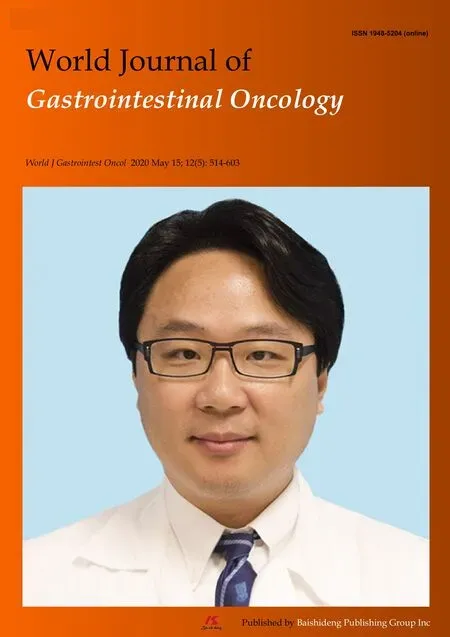Espresso coffee,caffeine and colon cancer
Anna Vittoria Mattioli,Alberto Farinetti
Anna Vittoria Mattioli,Alberto Farinetti,Surgical,Medical and Dental Department of Morphological Sciences related to Transplant,Oncology and Regenerative Medicine,University of Modena and Reggio Emilia,Modena 41124,Italy
Abstract
Key words:Espresso coffee;Caffeine;Colon cancer;Oxidative stress;Women;Antioxidants
TO THE EDITOR
We have read with great interest the paper “Caffeine and its main targets of colorectal cancer” by Cuiet al[1]and we found their conclusion of importance for clinical prevention.They review the biological effects of caffeine and summarize the association between colorectal cancer and caffeine.They concluded that the majority of studies support the hypothesis that caffeine has a protective effect on colorectal cancer.However,because quantity of caffeine in caffeine-containing drinks is difficult to standardize,epidemiological studies in humans cannot draw consistent conclusions.With reference to the data reported in the manuscript by Cuiet al[1],we would like to make a contribution to the discussion.
Lifestyle and nutrition strongly influence the development and prognosis of colon cancer[2].Specifically,Mediterranean diet has been associated with a low incidence of digestive tract cancer.The Mediterranean diet is a healthy and sustainable Diet,characterized by high intake of polyphenols.Coffee contributes to total polyphenols in the diet.Specifically,the espresso coffee is the most popular kind of coffee in Mediterranean countries[3,4].The concentration of antioxidants varies according to coffee preparation (mocha,percolated,espresso,filtered) and to the composition of coffee (i.e.,Arabica).Both these factors influence the bioavailability of antioxidants compounds.High antioxidants intake is an important tool in the prevention of atherosclerosis both in men and women and also prevents the onset of atrial fibrillation[5,6].
Similarly to what described by Cuiet al[1]for caffeine,also the beneficial effects derived from polyphenols appear to be mediated by several biochemical pathways and signalling mechanisms acting either independently or synergistically.Oxidative stress plays a dominant part in the causation of carcinogenesis.We also would like to suggest that there is a difference between men and women in carcinogenesis mediated by oxidative stress.In animal studies,oxidative stress seems to be higher in male than female.In individuals,the biomarkers of oxidative stress are higher in young men than in women[6,7].We are evaluating the difference in caffeine intake between men and women with colon cancer.The study is ongoing.Preliminary data were collected using a self-administered food frequency validated questionnaire[8].Caffeine consumption was specifically estimated as:Number of cups of coffee,type of coffee (espresso,American,decaffeinated,cappuccino),caffeinated soft drinks (i.e.,cola,energy drinks),tea (number of cups,quality of tea,duration of infusion),and number of chocolate snacks usually consumed.We estimated caffeine intake as 1 cup of espresso coffee = 90 mg,1 cappuccino = 110 mg,1 cup of American coffee = 160 mg,1 can of cola soda = 42 mg,1 can of energy drink according to manufacturer indications and one chocolate snack about 6 mg.Mediterranean population are used to drink espresso coffee (98% of our population) and/or cappuccino leading to homogenous caffeine estimation[8].We also collect data on changes in lifestyle occurred after diagnosis of colon cancer.
The paper by Cuiet al[1]deeply analysed the pathways linked to caffeine intake,considering that coffee is the most popular caffeinated drink we could hypothesized that anti-oxidants and caffeine play synergistically.Coffee contains many components other than caffeine,i.e.,phenolic antioxidants principally of chlorogenic acids.Coffee polyphenols have anticarcinogenic properties,as well as antihypertensive,hypoglycemic and hypolipidemic effects[7,9].Chlorogenic acids act as nutraceutical and food additives,making such molecules good candidates as a component of healthy diet[9].
We agree with Cuiet al[1]that additional studies,preferably prospective and interventional,are needed in order to investigate the mechanism of caffeine's effects on colorectal cancer,with a focus on differences between men and women.It is quite difficult to perform an interventional study on food and/or beverages,however evaluation of specific biomarkers would help to get useful information on differences between men and women.
 World Journal of Gastrointestinal Oncology2020年5期
World Journal of Gastrointestinal Oncology2020年5期
- World Journal of Gastrointestinal Oncology的其它文章
- Perineural invasion as a prognostic factor in patients with stage l-lll rectal cancer-5-year follow up
- Association of Helicobacter pylori infection with colorectal polyps and malignancy in China
- Gastric cancer with peritoneal metastases:Efficiency of standard treatment methods
- Perioperative chemotherapy for advanced gastric cancer-results from a tertiary-care hospital in Germany
- Neutropenia in colorectal cancer treated with oxaliplatin-based hyperthermic intraperitoneal chemotherapy:An observational cohort study
- Characterization and strong risk association of TLR2 del-196 to-174 polymorphism and Helicobacter pylori and their influence on mRNA expression in gastric cancer
